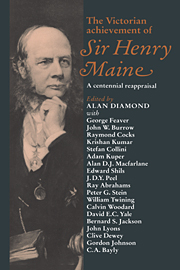Book contents
- Frontmatter
- Contents
- Notes on contributors
- Foreword by Sir John Lyons
- Introduction
- 1 The Victorian values of Sir Henry Maine
- PART 1 MAINE AND THE IDEA OF PROGRESS
- PART 2 MAINE AND THE SOCIAL SCIENCES
- PART 3 MAINE ON LAW, LEGAL CHANGE AND LEGAL EDUCATION
- PART 4 MAINE AND INDIA
- 18 The influence of Sir Henry Maine on agrarian policy in India
- 19 India and Henry Maine
- 20 Maine and change in nineteenth-century India
- Appendix: the conference programme
- Bibliography
- Index
19 - India and Henry Maine
Published online by Cambridge University Press: 04 September 2009
- Frontmatter
- Contents
- Notes on contributors
- Foreword by Sir John Lyons
- Introduction
- 1 The Victorian values of Sir Henry Maine
- PART 1 MAINE AND THE IDEA OF PROGRESS
- PART 2 MAINE AND THE SOCIAL SCIENCES
- PART 3 MAINE ON LAW, LEGAL CHANGE AND LEGAL EDUCATION
- PART 4 MAINE AND INDIA
- 18 The influence of Sir Henry Maine on agrarian policy in India
- 19 India and Henry Maine
- 20 Maine and change in nineteenth-century India
- Appendix: the conference programme
- Bibliography
- Index
Summary
Henry Maine was the Legal Member of the Council of the Governor-General of India from 1862 to 1869. The appointment involved serving in India and throwing into appropriate legislative form the policy-decisions of the Viceroy and his Council. Although Maine had doubted whether his health would stand up to extended residence in India (in fact illness had prevented him from accepting the job when it was first offered to him in 1861), the climate and the work suited him extremely well, and his friends were delighted to see how fit he was when he returned to Europe on leave in 1865. The office of Legal Member was a very attractive one for Maine. He had found that the openings for an academic lawyer in Britain were limited for one who could not withstand the rigours of practising at the Bar and at a time when legal studies in the universities were unrewarding both intellectually and financially. The appointment was well paid (Macaulay received £10,000 a year when he held the office in the 1830s) and, following the success of his first major publication (Ancient Law) in early 1861, Maine lobbied his political friends to secure him some such well-remunerated public position. His wife was unable to accompany him to Calcutta and so accordingly, as Mountstuart Grant Duff tells us, ‘He lived… the life of a bachelor; but a very hospitable member of that brotherhood.
- Type
- Chapter
- Information
- The Victorian Achievement of Sir Henry MaineA Centennial Reappraisal, pp. 376 - 388Publisher: Cambridge University PressPrint publication year: 1991
- 1
- Cited by



